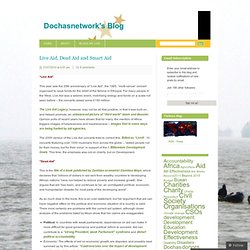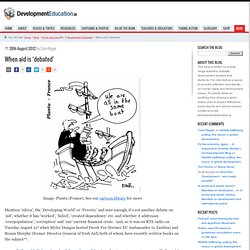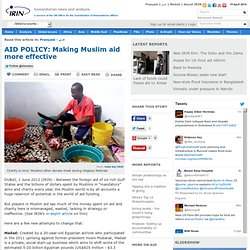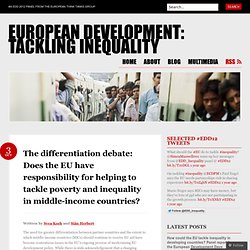

Post-Conflict & Peace. Community Communication. "Overpopulation"? ICT & Development. Live Aid, Dead Aid and Smart Aid. 31/07/2010 at 4:57 pm “Live Aid” This year saw the 25th anniversary of “Live Aid”, the 1985, “multi-venue” concert organised to raise funds for the relief of the famine in Ethiopia.

For many people in the West, Live Aid was a seismic event, mobilising energy and funds on a scale not seen before – the concerts raised some £150 million. The Live Aid Legacy, however, may not be all that positive, in that it was built on, and helped promote, an unbalanced picture of “third world” doom and disaster. Opinion polls of recent years have shown that for many, the mention of Africa triggers images of helplessness and hopelessness – images that in some ways are being fuelled by aid agencies. The 2005 version of the Live Aid concerts tried to correct this. “Dead Aid” This is the title of a book published by Zambian economist Dambisa Moyo, which declares that “billions of dollars in aid sent from wealthy countries to developing African nations” have not helped to reduce poverty and increase growth.
When aid is ‘debated’ Image: Plantu (France).

See our cartoon library for more Mention ‘Africa’, the ‘Developing World’ or ‘Poverty’ and sure enough, it’s yet another debate on ‘aid’, whether it has ‘worked’, ‘failed’, ‘created dependency’ etc. and whether it addresses ‘overpopulation’, ‘corruption’ and ‘our’ current financial crisis. And, so it was on RTE radio on Tuesday August 21st when Myles Dungan hosted Derek Fee (former EU Ambassador to Zambia) and Ronan Murphy (former Director General of Irish Aid) both of whom have recently written books on the subject**. → Follow this link to download the podcast of the show [21 August 2012 at 13:00 on Today with Pat Kenny, RTE Radio 1] What is so often hugely frustrating about these debates are the context and the terms of reference through which they are focused – the debate remains narrowly technical, avoids most of the ethical and moral or political dimensions and their implications. 1. 2. 3.
Explore more… Gapminder: Unveiling the beauty of statistics for a fact based world view. Development Effectiveness.
Development Effectiveness. Making Muslim aid more effective. Charity in kind: Muslims often donate meat during religious festivals DUBAI, 1 June 2012 (IRIN) - Between the foreign aid of oil-rich Gulf States and the billions of dollars spent by Muslims in “mandatory” alms and charity every year, the Muslim world is by all accounts a huge reservoir of potential in the world of aid funding.

But players in Muslim aid say much of the money spent on aid and charity here is mismanaged, wasted, lacking in strategy or ineffective. (See IRIN’s in-depth article on this) Here are a few new attempts to change that: Madad: Created by a 30-year-old Egyptian activist who participated in the 2011 uprising against former president Hosni Mubarak, Madad is a private, social start-up business which aims to shift some of the estimated 5-20 billion Egyptian pounds (US$825 million - $3.3 billion; statistics are not consistent) spent by ordinary people on charity every year towards more sustainable development.
Ha/cb.
Aid Transparency. Private Sector. Hunger and Food Security. Resilience & Risk Reduction. Poverty is Exclusion, Dev is Inclusion. Development as Freedom. Justice, Not Charity. Tackling inequality. Written by Svea Koch and Siân Herbert The need for greater differentiation between partner countries and the extent to which middle-income countries (MICs) should continue to receive EU aid have become contentious issues in the EU’s ongoing process of modernising EU development policy.

While there is wide acknowledgement that a changing development landscape requires donor agencies to better adapt their approaches to the varying levels of development of partner countries (‘differentiation‘), there seems to be less agreement on the nature of these changes and how exactly the EU should respond to them. The first controversy refers to the changing geography of poverty: Has poverty really turned from an international to a national distribution problem in MICs as claimed by a recent study on the ‘new bottom billion’? Is poverty in MICs transitory or are we likely to see the majority of poor people in MICs in the medium and long term? Like this: Like Loading...
Sports & Development.